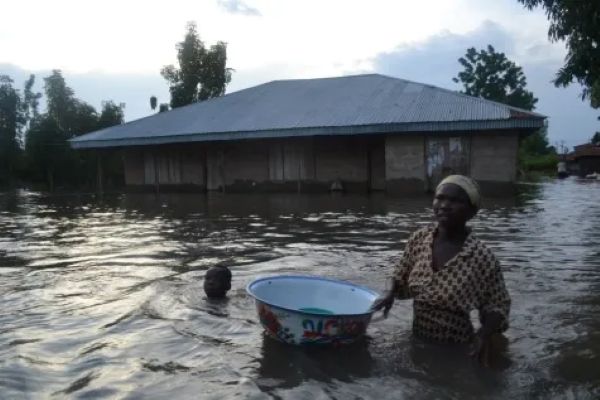NiMet Issues Nationwide Flash Flood Warning Amid Intensifying Thunderstorms and Rainfall

The Nigerian Meteorological Agency (NiMet) has issued a high-impact weather advisory, warning of severe thunderstorms, moderate to heavy rainfall, and potential flash floods across several regions of the country from Monday to Wednesday. The forecast raises concerns over economic disruption, infrastructure strain, and public safety risks, particularly for sectors such as agriculture, logistics, insurance, construction, and aviation.
This intensified weather pattern, driven by seasonal wind convergence zones, reflects the broader reality of climate variability, with Nigeria’s monsoon season now increasingly marked by unpredictability and localized extreme weather events.
Regional Impact Overview: Northern, Central, and Southern Zones
Northern Region:
- States Affected: Adamawa, Taraba, Kebbi, Zamfara, Jigawa, Kano, Katsina, Kaduna, Sokoto, Bauchi, Yobe, Gombe, and Borno
- Forecast: Morning and afternoon thunderstorms with moderate rainfall across all days.
- High Flood Risk Zones: Adamawa, Taraba, Bauchi—especially along low-lying settlements and river basins.
Central Region:
- States Affected: FCT, Benue, Kogi, Niger, Kwara, Nasarawa, Plateau
- Forecast: Intermittent light rainfall throughout the forecast period.
- Implication: Increased soil saturation raises risks of road washouts and crop damage, particularly in agrarian communities.
Southern Region:
- States Affected: Lagos, Ogun, Oyo, Osun, Ekiti, Ondo, Edo, Delta, Bayelsa, Rivers, Akwa Ibom, Cross River, Enugu, Ebonyi, Abia, Anambra, Imo
- Forecast: Cloudy skies with widespread light rains, intensifying in the afternoons.
- Flash Flood Hotspots: Lagos, Delta, Bayelsa, Akwa Ibom, Cross River, Anambra—urban flooding likely due to blocked drainage and poor infrastructure planning.
Business and Economic Implications: Who Should Be Alert
1. Agriculture:
Excess water from flash flood can disrupt harvesting and destroy standing crops, especially in North Central and Southern states. Smallholder farmers are urged to protect produce and delay fertiliser application where flooding is imminent.
2. Logistics and Supply Chain:
Trucking and inter-state movement may be hampered by submerged roads and deteriorating rural access roads. FMCG and agro-based firms must prepare for inventory delays and reroute plans accordingly.
3. Insurance Sector:
Rising incidence of property and vehicular claims from water damage is anticipated. Underwriters and brokers should consider activating disaster response teams for high-risk zones.
4. Construction and Real Estate:
Structural exposure to flooding risks continues to highlight the importance of climate-resilient building codes, particularly in flood-prone cities like Lagos, Port Harcourt, and Yenagoa.
5. Aviation and Transport:
NiMet has advised airline operators to consult airport-specific weather reports for safe flight scheduling. Delays and cancellations are possible due to low visibility and waterlogged runways.
Public Advisory and Safety Measures
NiMet’s bulletin urges:
- Avoid driving in floodwaters or during heavy downpours
- Activate community-level emergency response plans in flood-prone LGAs
- Disconnect electrical appliances during thunderstorms
- Avoid sheltering under trees or unsecured structures
- Secure loose outdoor objects that may become hazardous debris
- Ensure warm clothing for vulnerable populations due to cooler nighttime temperatures
The public is advised to follow real-time updates via www.nimet.gov.ng and local broadcast channels. Local governments, disaster response agencies (NEMA/SEMA), and urban authorities have been urged to pre-activate flash flood contingency plans.
BRANDECONOMY INSIGHT: Building a Weather-Resilient Economy
The increasing frequency of these high-impact weather alerts underscores the need for a national shift toward climate-adaptive infrastructure and disaster-resilient economic planning. With urban flooding becoming a recurring fiscal and humanitarian issue, stakeholders across both public and private sectors must:
- Integrate climate forecasts into business continuity planning
- Deploy smart water management systems in urban developments
- Expand weather-indexed insurance access for farmers and SMEs
- Enforce compliance with environmental impact assessments (EIA)
As climate unpredictability becomes the new norm, information, preparation, and collaboration remain the most powerful safeguards against economic loss and human tragedy.












